New marketers often ask: What does SERP Stand for?
The answer is simple: SERP stands for Search Engine Results Page and refers to a page which contains a list of websites (search engine results) that is normally produced by a Search Engine website after a user enters a search.
What is a SERP
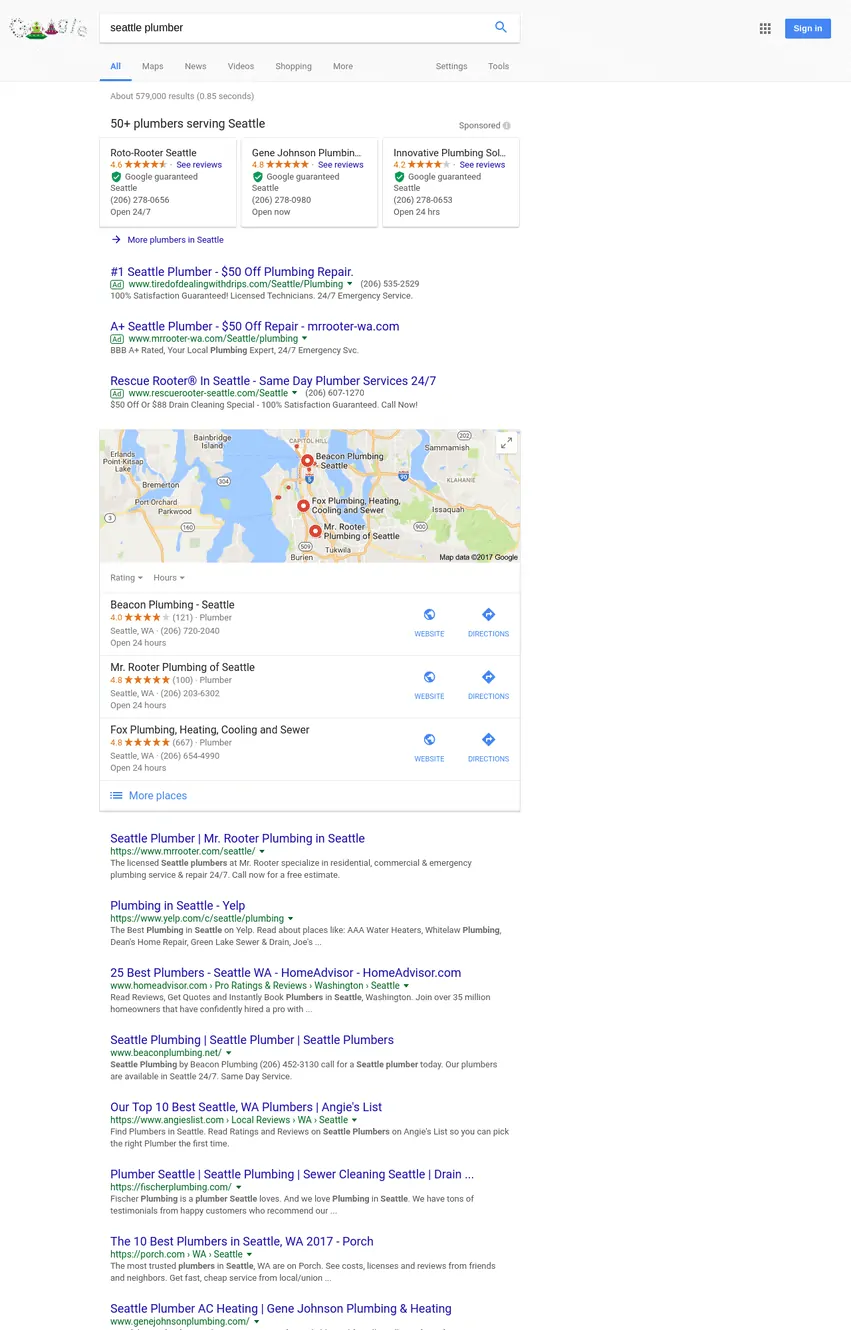
This is an example of a what is SERP (Search Engine Results Page)
Search engine results page contain many common elements. A scientific paper published on Penn State University explains SERPs in more scientific detail. In this article, we’ll cover the basics.
What are the different parts of a search engine result page (SERP)?
- Ads for websites which pay for the placement
- List of relevant websites produced by an ‘organic’ algorithm
- Featured Snippets
- Maps
- Videos
- Local business listings
- etc.
What are SERP Features
An SERP feature is a result on Google SERPs that is not a traditional organic search result. SERP features are always being added by Google, but the most common ones are:
| SERP Feature | Description |
|---|---|
| Rich Snippet | These search result snippets contain a visual element (review stars for example) |
| Paid Results | Search results that are bought by bidding on keywords |
| Universal Results | Search results that appear in addition to regular organic search results (image results for example) |
| Knowledge Graph | Search results which contain data contained in a data or a graph |
SERP Infographic
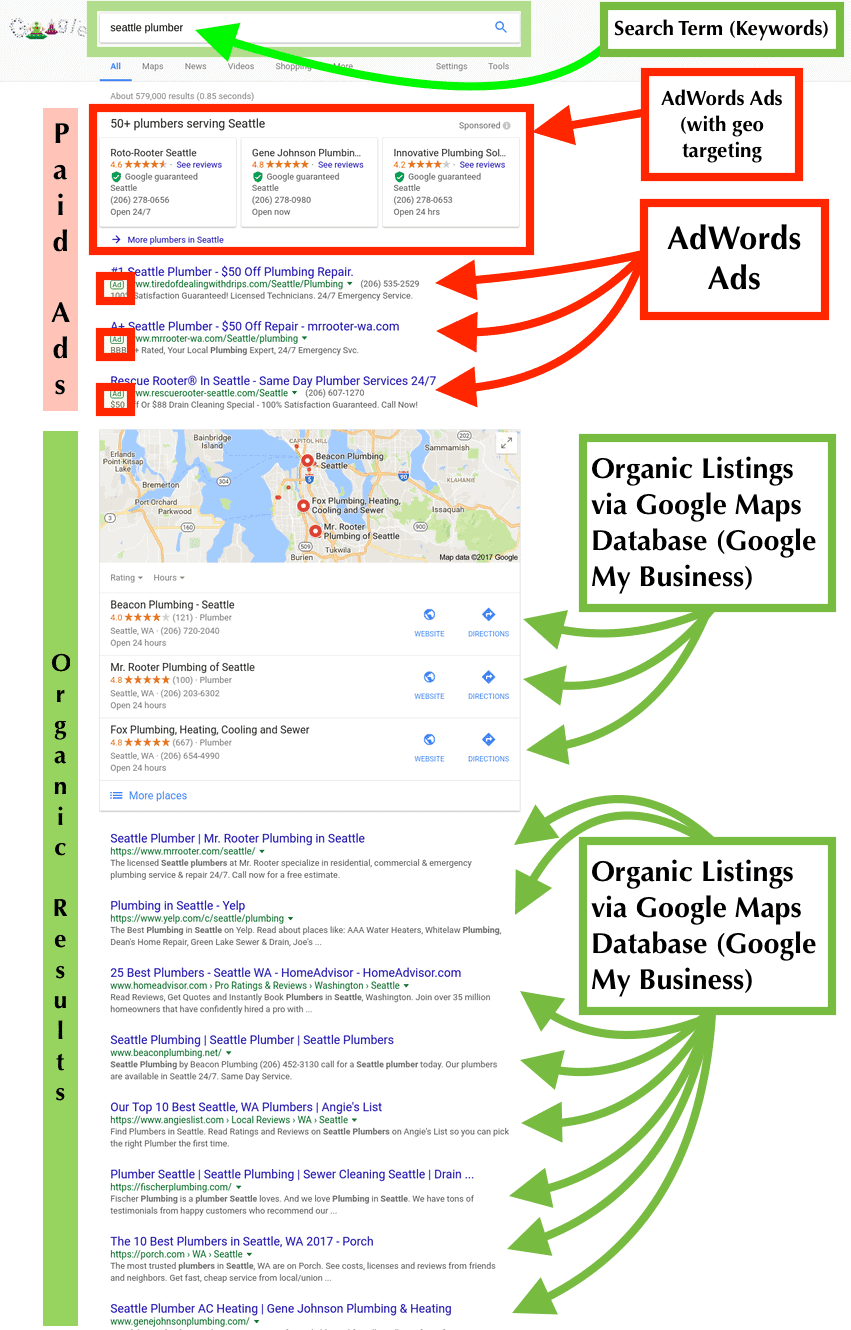
SERP Infographic
Google Ads in SERP
Google and other search engines place their paid ads at the top of the search results pages. Google’s advertising search engine advertising is known as Google AdWords.
Some Google searches show unique ad formats that don’t appear on other types of searches.
Businesses and Non-profits will often hire a Search Engine Advertising company to assist them in buying and improving their advertising on Google.
Local Business Ads on Google
Recently Google began showing a carousel of ads featuring local businesses. If a business wants to appear in this section, they must advertise on Google AdWords by targeting a local geographic area. There isn’t a particular setting or option to appear in this section. Google will place advertisers who are bidding on local keywords and link their Google Business page to their AdWords platform.
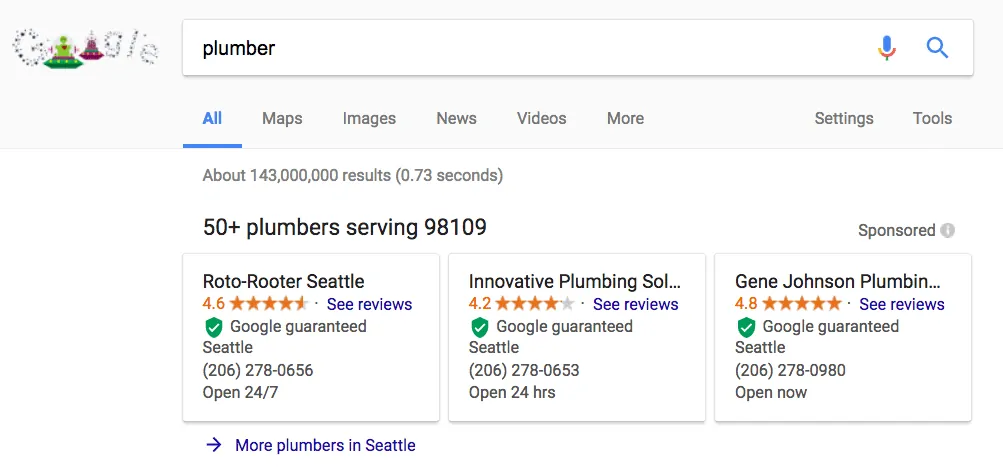
Google Local Business Maps Ads
Another ad format that is really popular with people selling products online is known as Google Shopping campaigns via Google AdWords.
Google eCommerce Ads – also known as Google Product Listings Ads or Google Shopping Campaigns
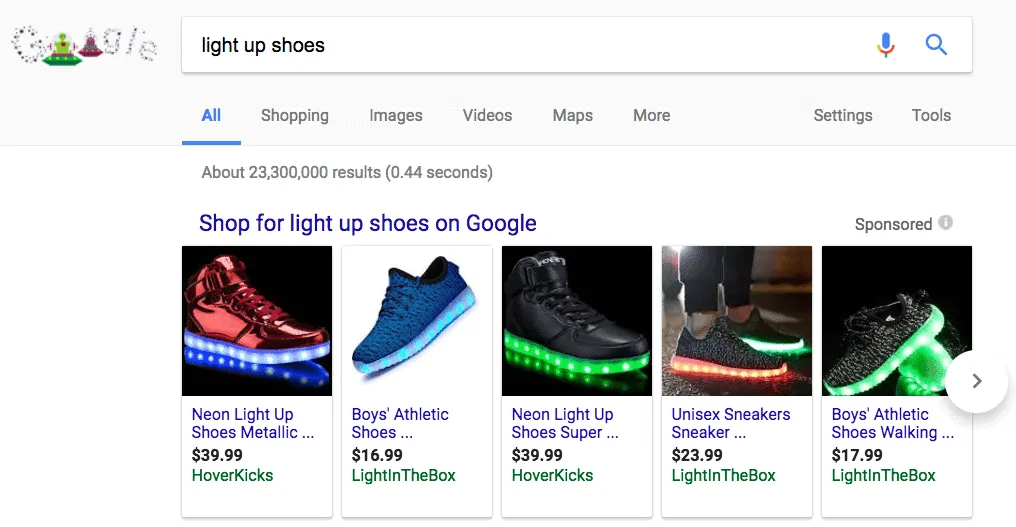
Google Ecommerce Ads “Shopping Campaigns”
Google Shopping Campaigns were formerly known as Google Product Listing Ads (Google PLAs). These are special advertisements that feature a product image, pricing information and product name in the same ‘spot’ as a normal Text ad.
These ads use the same keyword bidding auction system as Google AdWords, but the design of the ad unit is much more limited. Businesses provide a data feed or upload their products to Google Merchant Center, and from there Google AdWords consumers the GMC data to produce these ads.
To learn more about how this works, we recommend a podcast that Hayk Saakian spoke on: Getting Started With Google AdWords for eCommerce business owners with Bob Dunn, the owner of BobWP.com.
Traditional Google AdWords Text Ad Units
These Text Ad Units are the most commonly known ads that people see on Google.
Google’s Organic Search Results
Organic search results are the listings that are produced via Google’s patented Search Algorithm. Google scans the entire internet for new web pages and shows results linking to those pages for keywords which are relevant and authoritative for whatever someone searches.
Some of the organic search results are map listings from Google’s map database, while others are more traditional text and simple links.
What is Traditional SERP
These results are simple links to websites which include a Title and Description to help users decide which results to click on.
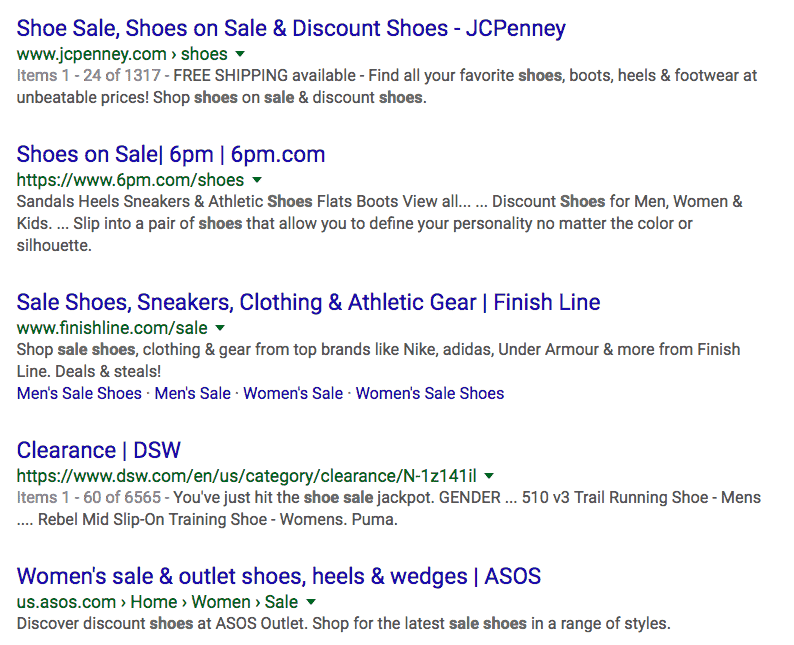
Here is an example of Organic Search Results
The Title and Description that you see in Organic Search Results is often times written by the website owner. Website owners will specify a ‘title tag’ and a ‘meta description’ in their website code. Sometimes Google will show those two pieces exactly as they are specified. Other times, Google will replace the Title or Description that the website owner wrote with one of their own.
Google Search on mobile devices and Google Voice Search draws from the same database as “traditional” organic search.
Aside from ‘normal’ search results, you can also see Organic maps listings in Google searches. These listings use the data that you would see in Google Maps by performing the same searches. To improve their rankings in search engines, local businesses will often hire an SEO company.
What Are Google Local Listings? Google Organic Local Listings Example:
Google Local Listings are Google Maps search results which are presented directly inside a normal Google.com search, often in the form of a ‘3 pack.’ The 3 Pack usually includes an interactive map on top, along with information about the 3 most ‘relevant’ businesses for a particular search.
Businesses can provide their information to Google using the Google My Business platform. “Google My Business” is very similar to Yelp and other review websites and competes with them directly.
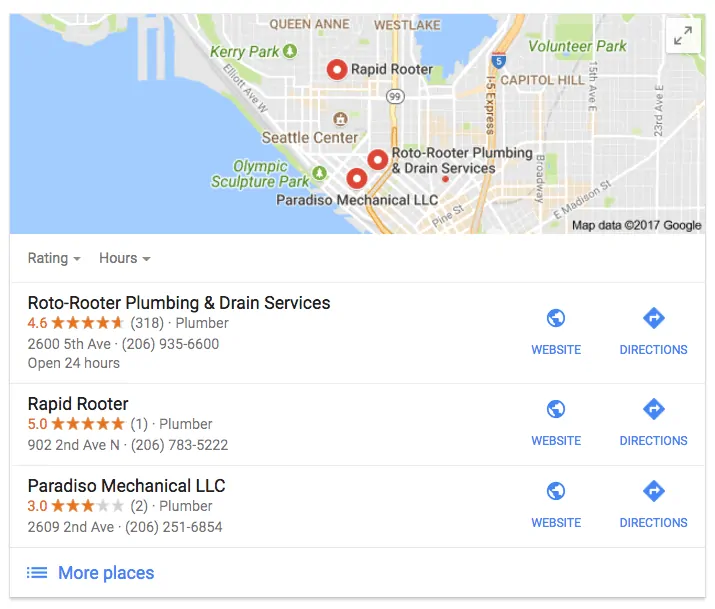
Example of Google Local Business Maps Results
These maps listings will frequently show up ahead of links to businesses’ websites. Yelp and other competitors have complained that by giving preferential treatment to Google My Business data, Google is behaving like a Monopoly.
What are Google Featured Snippets? [Updated 2018]
Google Featured Snippets are short answers that are shown directly within Google search results. The information in Featured Snippets is extracted from 3rd party web pages that Google crawls every day. Paragraphs, Lists, and Tables are three of the most common types of snippets.
This is an example of a Featured Snippet. Featured snippets are highly coveted because they tend to attract the most attention and the most clicks compared to any other feature in a search engine results page.
If you found that this article was helpful, please tell us in the comments. I intend to expand it to explain every other type:
- Click to Call Ads on Google
- Videos in Google Search Results
- “People also Ask” box
- Recipes in Google Search
If you have any questions about search engine results pages, on Google, Yahoo, or Bing we’re happy to help. Ask in the comments section below, and one of our experts will answer.
If you have a question that you would like to ask privately, feel free to email us, contact us on Facebook, call us, or fill out our contact form on this website.
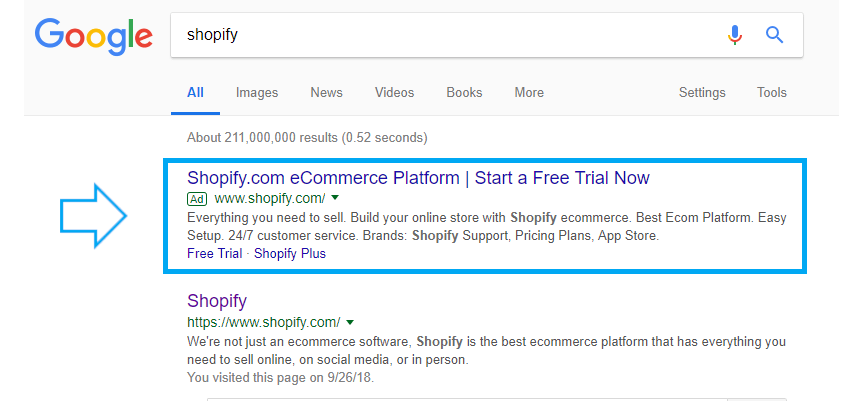
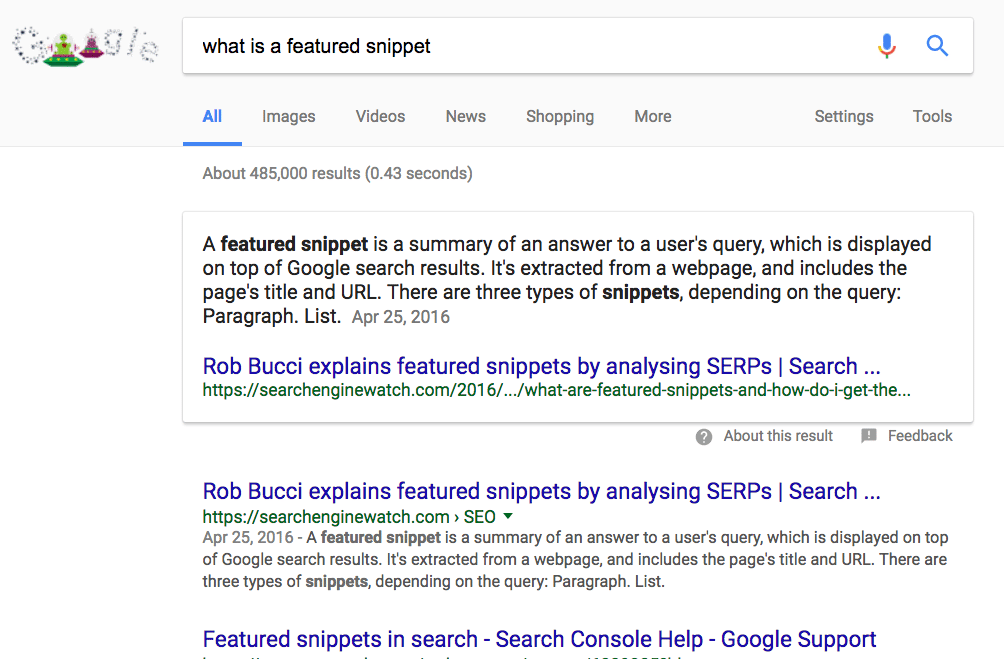



0 Comments